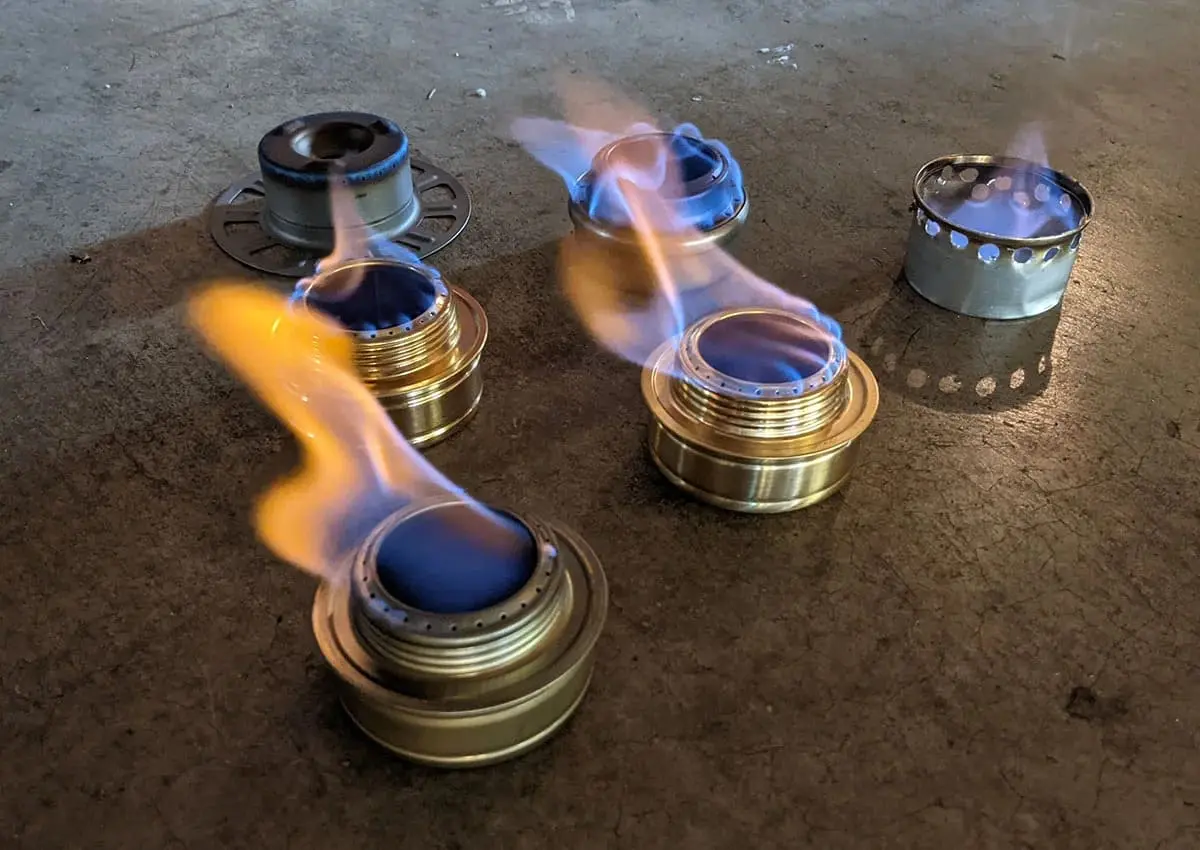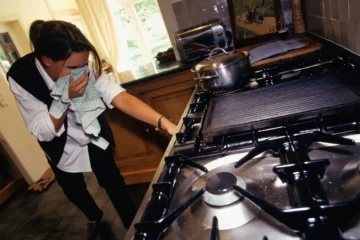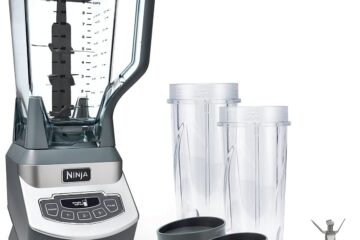Camping enthusiasts, backpackers, and outdoor adventurers are constantly searching for the most efficient and lightweight way to cook their meals while in the great outdoors. The age-old debate between alcohol stoves and propane stoves continues.
To help you make an informed decision, this blog post compares alcohol stove vs propane, weighing their pros and cons. From cost and weight to cooking speed and efficiency, this comprehensive guide covers everything you need to know about each stove type, helping you make the best choice for your outdoor cooking needs. So, gear up, and let’s dive into alcohol stoves versus propane stoves!
What Is An Alcohol Stove? How Does An Alcohol Stove Work?
An alcohol stove is a portable stove that burns alcohol (such as ethanol or methanol) as fuel. It works by heating the fuel in the stove’s burn chamber, causing it to vaporize. The vapor mixes with air and burns, producing heat used to cook food or boil water. Alcohol stoves are lightweight and simple to use. They require no electricity or pump, making them popular for outdoor enthusiasts and camping trips.
What Is A Propane Stove? How Does A Propane Stove Work?
A propane stove is a cooking appliance that uses propane gas as a fuel source. It typically consists of burners with controls to regulate the heat and a propane tank that connects to the stove to supply the gas.
Propane stoves work by using a small amount of propane gas from the tank, which is mixed with air and burned to create heat. The heat is then transferred to the cooking surface, such as a pan or pot, to cook food. The heat output from the burners can be adjusted by turning the controls, allowing for precise temperature control.
Alcohol Stove Vs Propane: What is the actual difference?
Alcohol stoves and propane stoves are two types of camping stoves that are commonly used for cooking. Here are the key differences between the two:
Fuel
Alcohol stoves run on denatured alcohol or ethanol, while propane stoves run on propane gas.
Efficiency
Propane stoves are more efficient than alcohol stoves, producing more heat per unit of fuel consumed. This means propane stoves can boil water faster and cook food more quickly.
Portability
Alcohol stoves are generally lighter and more compact than propane stoves, making them easier to transport and store. Propane stoves are typically bulkier and heavier and often require a separate canister.
Safety
Propane stoves are generally considered safer than alcohol stoves, as they are less prone to spilling and do not produce open flames. Propane stoves also typically have safety features, such as automatic shut-off valves, to prevent accidental fires.
Availability
Propane fuel is widely available at outdoor retailers, gas stations, and hardware stores, while denatured alcohol can be more difficult to find.
Environmental Impact
Alcohol stoves are considered more environmentally friendly than propane stoves, as they produce fewer carbon emissions and are made from renewable materials.
Overall, both alcohol stoves and propane stoves have their advantages and disadvantages. The choice between the two will depend on personal preferences, specific needs, and preferences for outdoor cooking.
Which Stove Is Better For You? Factors To Consider
When choosing between an alcohol stove and a propane stove, there are several factors to consider:
Purpose
When choosing an outdoor stove, consider what cooking you will be doing and whether you need one that can handle high temperatures. For example, suppose you’re a backpacker looking for a lightweight and compact stove. In that case, an alcohol stove may be a better option. If you’re a camping family looking for a stove that can cook a large meal quickly and easily, a propane stove may be a better choice.
Fuel Availability
Consider where you will be camping and whether you can easily find alcohol or propane fuel. Alcohol fuel may be harder to find in some areas, while propane is widely available.
Cost
Consider how much you think you will use your stove and how much fuel it will cost. Alcohol stoves are often less expensive initially, but the fuel cost can increase over time. Propane stoves tend to be more expensive initially, but fuel costs are often lower in the long run.
Weight and Portability
Consider the weight and size of the stove, especially if you carry it in a backpack. Alcohol stoves tend to be lighter and more compact, while propane stoves can be heavier and bulkier.
Cooking Performance
Consider each type of stove’s heat output and cooking performance. Propane stoves are more efficient and produce more heat, while alcohol stoves may take longer to cook food.
Safety
Be sure to consider the safety features of each stove and choose the one that will best suit your needs. Propane stoves are generally considered safer, but alcohol stoves can be less prone to accidental fires.
Environmental Impact
Consider the environmental impact of each stove and choose the one that is most environmentally friendly. Alcohol stoves produce fewer emissions and are made from renewable materials, while propane stoves may produce more emissions.
Alcohol Vs Propane Backpacking Stove
When choosing between an alcohol stove and a propane stove for backpacking, there are several factors to consider. Alcohol stoves are lighter and more compact, making them a good choice for backpackers looking for a lightweight and portable stove. However, they can be slower to cook and require more fuel to produce the same heat as a propane stove.
Propane stoves are bulkier and heavier than alcohol stoves but are also more efficient and produce more heat. Propane fuel can be more easily found on the trail and is typically less expensive in the long run than alcohol fuel. Ultimately, the choice between an alcohol stove and a propane stove for backpacking will depend on your specific needs and preferences for outdoor cooking.
Butane Vs Propane Stove Indoors
Butane and propane are both commonly used as fuel for indoor stoves.
Propane is a more powerful fuel than butane, with a higher energy content per unit of volume. It burns hotter and provides more heat output per stove, making it more suitable for outdoor use.
Butane, on the other hand, is a cleaner-burning fuel with a lower energy content and is less likely to produce fumes. It is often preferred for indoor use as it is less likely to produce harmful fumes or pollute the air.
Both fuels have advantages and disadvantages, and the choice of an indoor stove ultimately depends on personal preference, location, and intended use.
- Kucht Vs Thor (Everything Explained By Experts)
- Gaggenau Vs Miele: Which Is The Better Appliance Brand?
The Pros And Cons Of Using An Alcohol Stove.
Pros of using an alcohol stove:
Lightweight and portable
Alcohol stoves are lightweight and easy to carry, making them a great option for camping and backpacking trips.
Low cost
Alcohol stoves are relatively cheap compared to other camping stoves, making them an economical choice.
Simple to use
Alcohol stoves are simple to operate, with few moving parts or complicated controls.
Readily available fuel
Denatured alcohol, commonly used in alcohol stoves, is widely available and relatively inexpensive.
Cons of using an alcohol stove:
Lower heat output
Alcohol stoves provide lower heat output than other camping stoves, making it more challenging to cook larger or heavier meals.
Longer cooking time
Alcohol stoves take longer to cook food than other camping stoves, which can be an issue when time is limited.
Less control over the flame
Alcohol stoves have limited control, making it more challenging to regulate the heat and maintain a consistent cooking temperature.
More delicate
Alcohol stoves are more delicate and can be easily damaged compared to other camping stoves, requiring more care and maintenance.
How To Use An Alcohol Stove?
Here are the basic steps for using an alcohol stove:
Fill the stove
Fill the stove with denatured alcohol or another alcohol fuel through the fuel filler hole. Ensure not to overfill, as this can cause the stove to become unstable and spill.
Light the stove
Use a long lighter or matches to light the stove. The stove will start to heat up, and the alcohol will begin to evaporate and ignite.
Place the pot or pan
Place your pot or pan on top of the stove, making sure it is centered and stable.
Adjust the flame
The stove’s flame can be adjusted by adjusting the size of the flame hole or by covering it partially to reduce the heat output.
Cook your food
Once the stove is lit and your pot or pan is in place, you can begin cooking your food. Alcohol stoves typically take longer to heat up and cook than other camping stoves, so be patient.
Extinguish the stove
After cooking, allow the stove to cool down completely before extinguishing it by covering the flame hole. Store the stove and fuel in a safe place for future use.
The Pros And Cons Of Using A Propane Stove.
Pros of using a propane stove:
High heat output
Propane stoves have a high heat output, making them ideal for cooking large or heavy meals.
Consistent flame
Propane stoves have a consistent flame, providing more control over the heat and making it easier to maintain a consistent cooking temperature.
Easy to use
Propane stoves are easy to use and typically have straightforward controls, making them simple to operate.
Widely available fuel
Propane fuel is widely available and relatively inexpensive, making it easy to find and refill the stove’s fuel tank.
Cons of using a propane stove:
Weight and bulk
Propane stoves are typically heavier and bulkier than other camping stoves, making them less suitable for backpacking or other activities where weight is a concern.
Higher cost
Propane stoves are generally more expensive than other camping stoves, making them a more significant investment.
Limited fuel supply
Propane stoves have a limited fuel supply, making it necessary to carry spare fuel tanks or have a convenient fuel source.
Fumes and pollution
Propane stoves can emit fumes and contribute to air pollution, making them less suitable for use in areas with sensitive ecosystems or limited ventilation.
How To Use A Propane Stove?
Here are the basic steps for using a propane stove:
Set up the stove
Place the stove on a level and stable surface, ensuring it is far away from flammable materials. Connect the propane fuel tank to the stove using the appropriate hose and regulator.
Turn on the fuel
Open the valve on the propane tank to allow fuel to flow to the stove. If the stove has a built-in igniter, turn the knob to ignite the stove. If it doesn’t, use a lighter or matches to light the stove.
Adjust the flame
The stove’s flame can be adjusted using the knobs or controls on the stove, making it possible to increase or decrease the heat output.
Place the pot or pan
Place your pot or pan on top of the stove, making sure it is centered and stable.
Cook your food
Once the stove is lit and your pot or pan is in place, you can begin cooking your food.
Turn off the fuel
When you are finished cooking, turn off the valve on the propane tank to stop the fuel flow. Allow the stove to cool down completely before storing it.
Convert Alcohol Stove To Propane: How to Do it?
Converting an alcohol stove to a propane stove typically involves installing a propane regulator and a fuel line and modifying the stove’s burners to accommodate the different flame characteristics of propane. Here are the steps to convert an alcohol stove to propane:
Gather materials
You will need a propane regulator, a fuel line, and adapters or fittings. You will also need pliers, a wrench, and a drill or other cutting tool.
Remove the alcohol burners
Remove the alcohol burners from the stove and replace them with propane burners.
Install the regulator
Connect the propane regulator to the fuel line and the propane tank. The regulator controls the pressure of the fuel, allowing you to adjust the flame height and heat output.
Connect the fuel line
Connect the fuel line to the regulator and the stove. Make sure the connection is secure and leak-free.
Modify the stove
Depending on the design of your stove, you may need to modify it to accommodate the different flame characteristics of propane. This may involve drilling new flame holes, adjusting the size of the existing flame holes, or making other modifications.
Test the stove
Once you have completed the conversion, test the stove to ensure it is working properly and that the flame height and heat output are adjusted to your desired level.
Do Propane Stoves Need Electricity?
No, propane stoves do not require electricity to operate. Propane stoves use pressurized propane fuel to generate heat, which is then used for cooking food. Propane stoves typically do not require any electrical connection, making them a reliable option for outdoor cooking or when electricity is not readily available. Some propane stoves may have built-in ignition systems that require a battery. Still, these are unnecessary for the stove to function, and a lighter or matches can be used instead.
Is Butane Or Propane Better For Camp Stove?
Whether butane or propane is better for a camp stove depends on your specific needs and preferences. Both fuels have unique advantages and disadvantages, and the best choice for you will depend on cost, availability, portability, and performance.
Propane
Pros:
- Widely available and easy to find, even in remote areas.
- Consistent performance in a wide range of temperatures.
- It can be stored in large containers, making it a good choice for extended camping trips.
Cons:
- Slightly more expensive than butane.
- Heavier and less portable than butane.
Butane
Pros:
- Lightweight and highly portable, making it a good choice for backpacking or other activities where weight is a concern.
- Inexpensive compared to propane.
Cons:
- It can be challenging to find in remote areas.
- Temperature affects performance, and it may not work as well in cold weather.
- Limited storage capacity makes it a less practical choice for extended camping trips.
Ultimately, the choice between butane and propane comes to your specific needs and preferences. Butane might be the better choice if you need a lightweight and portable stove for backpacking. If you are looking for a reliable stove for extended camping trips, propane might be the better option.
Alcohol Stove Vs Pocket Rocket
An alcohol stove is a lightweight, portable stove that burns denatured alcohol as fuel. It’s simple to operate and maintain and suitable for camping, backpacking, and other outdoor activities.
A Pocket Rocket stove is a compact, lightweight backpacking stove made by MSR (Mountain Safety Research). It runs on propane canisters and is known for its fast boiling times and reliable performance in various weather conditions.
Both stoves have their pros and cons. Alcohol stoves are less expensive and environmentally friendly. Still, they burn more slowly and are less consistent than canister stoves like the Pocket Rocket. The Pocket Rocket is more expensive and requires the purchase of canisters. Still, it boils water faster and is more convenient for cooking various meals.
Alcohol Stove Vs Canister
Alcohol and canister stoves are both portable stove options for outdoor activities such as camping and backpacking.
Alcohol stoves run on denatured alcohol, which is readily available and relatively cheap. They are lightweight, easy to use, and require minimal maintenance. However, they have a slower boil time and are less efficient in cold weather than canister stoves.
Canister stoves run on pressurized fuel from a canister, typically isobutane, which provides a high heat output and is efficient in cold weather. Canister stoves are more convenient and easier to use than alcohol stoves. Still, they are heavier and more expensive in the long run.
Alcohol Stove Vs Jetboil
An alcohol stove and a Jetboil are both camping stoves. Still, they function differently and have different advantages and disadvantages.
An alcohol stove is a simple, lightweight stove that burns denatured alcohol. They are often inexpensive and easy to use, but they can be less efficient and take longer to boil water than other stoves.
A Jetboil, on the other hand, is a compact, all-in-one stove and cooking pot system that uses propane or isobutene fuel. Jetboils are known for their fast boil times and efficiency, and they are a good option for those who want a quick and easy way to boil water for dehydrated meals or hot drinks. However, they can be more expensive and less versatile than other stoves.
The Final Words
All in all, both alcohol and propane stoves have pros and cons. Alcohol stoves are lightweight, low-cost, and eco-friendly but have a slow boil time and limited fuel options. On the other hand, propane stoves quickly boil and have a steady flame. Still, they are heavier, more expensive, and less environmentally friendly.
Ultimately, choosing an alcohol and propane stove will depend on your personal preferences, budget, and intended use. If you prioritize speed and convenience, propane may be the way to go, but if you prioritize affordability and sustainability, an alcohol stove might be the better choice. Consider your specific needs and weigh the trade-offs before making a decision.
Frequently Asked Questions
Are Propane Stoves Efficient?
Propane stoves are known for their efficiency in heating, as they can heat up quickly and reach high temperatures. Additionally, propane is a clean-burning fuel source, making it a more environmentally friendly option than other stove fuels.
Are Alcohol Stoves Safe?
Yes, alcohol stoves are safe when used properly and according to the manufacturer’s instructions. However, it is important to remember that alcohol is flammable and can pose a fire hazard.
How Often Should A Propane Regulator Be Replaced?
Every 15 years or when showing signs of wear and tear. Regular maintenance and inspection can prolong its lifespan.
Are Alcohol Stoves Any Good?
Yes, Alcohol stoves are good for backpacking and camping as they are lightweight, fuel is readily available, and are environmentally friendly. They are also cheap and easy to use, making them a popular option for outdoor enthusiasts.
What Are The Advantages Of Alcohol Stoves?
Alcohol stoves are lightweight and compact, making them great for backpacking and camping trips. They also burn clean, with no harmful emissions, and are easy to use, requiring only fuel and a lighter to start a fire.
Do Alcohol Stoves Work In Winter?
Yes, alcohol stoves can work in winter as long as they are protected from the wind and have proper insulation. However, low temperatures may affect their performance, so it is important to use proper fuel and techniques to ensure efficient combustion.
Do Alcohol Stoves Put Off Carbon Monoxide?
Yes, alcohol stoves can release carbon monoxide if not used properly. Using them in a well-ventilated area is important to avoid harmful gas inhalation.
What Are The Disadvantages Of An Alcohol Stove?
An alcohol stove is less efficient than other fuel options and needs to provide consistent heat control. It also has a longer boil time compared to other stove types.
What Kind Of Gas Do You Use In An Alcohol Stove?
The most commonly used gases in an alcohol stove are ethanol and methanol. Both are alcohol-based fuels that burn cleanly and efficiently.



